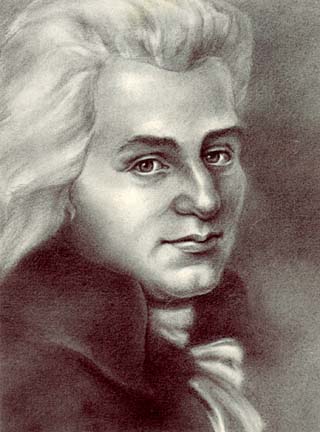


IT STARTS with something superficial. Maybe you'd just like to dress up for a change. Or maybe you're feeling a bit culture-deprived. Then again, perhaps you crave something more elaborate -- an escape from modern life and all its attendant stresses. But trips to Tahiti are expensive; furthermore, you can't get the time off. Major works,
minor concernsAnyway, that's not what you're really looking for. You just want a little of that other thing -- what's the word? -- transcendence. At which point, by happy coincidence, you come across this article about an all-Mozart program at the Honolulu Symphony. Perfect, no? Mozart -- the boy genius, the merry prankster of "Amadeus," the guy whose music accompanies all those car commercials. He'll drag you out of the doldrums, right?
Well, maybe. But before you rush that suit to the dry cleaners, be forewarned: the trio of works in this week's program are among the most emotionally complex in the Mozart canon. The trademark sunniness is still in evidence, but just as in Hawaii, windward and mauka showers are a constant threat. And when the symphonic clouds burst open, a veritable torrent of despond is released. This is Mozart at his most ambivalent -- cheerful one moment, somber and meditative the next. But if the pieces defy description, they also defy prescription. Expect neither tranquilizing elixir nor classical Prozac from Dr. Mozart here.
"Mozart is for me in many ways a voice of God," said Samuel Wong, the musical director of the Honolulu Symphony. If that's true, God didn't mind writing in a minor key. Describing the music variously as "bittersweet," "smiling through tears" and "so achingly beautiful that you cry," Wong confessed a special affection for these pieces, even as he grappled with the mystery of their origin.
Scholars who seek biographical justification for the composer's serious turn -- as if life itself weren't reason enough -- will remind you that Mozart had suffered a number of personal setbacks in the days preceding composition of symphonies 40 and 41. His daughter Theresia had just died at the age of six months (the third of four Mozart children to die in infancy). As well, the commissions on which the composer relied were drying up, and in 1788, his family was forced to relocate to the Vienna suburbs. On this view, Mozart's musical solemnity is traceable to that familiar combination of personal tragedy, financial ruin and suburban living. But for Wong, such connections are spurious.
"That's a dangerous leap," he said of Mozart's minor-key motivations. "You have to relate (the music) to the body of work that preceded it rather than the particular marital or personal condition that preceded it. That's the more important comparison, rather than the particular age or infirmity."
Furthermore, Mozart wrestled with dark emotions throughout his adult life, never more eloquently than in the serenade for wind octet (also on the Honolulu program), which was written at least five years earlier than the events of 1788. Watch especially for the tug-of-war between major and minor keys during the piece's final movement. The battle's outcome is completely in doubt until the serenade's last bars, when the movement is overtaken by...
Wait, we won't spoil the surprise. If you thought the piece ended in a minor key, you might well cancel the babysitter, leave the clothes at the cleaners and order in. And if you knew things ended in a major way, your expectations might run toward Viennese pastry and "Eine Kleine Nachtmusik." Better that you should find out for yourself. Just don't blame us if your illusions of a merry Mozart are forever shattered.
Mozart mania
Honolulu Symphony plays an all-Mozart program:In concert: 4 p.m., Sunday; 7:30 p.m., Tuesday
Place: Blaisdell Concert Hall, 777 Ward Ave.
Program: Symphony No. 40 in G Minor; Serenade No. 12 in C Minor; Symphony No.41 in C Major, "Jupiter."
Cost: $15-$55
Call: 792-2000